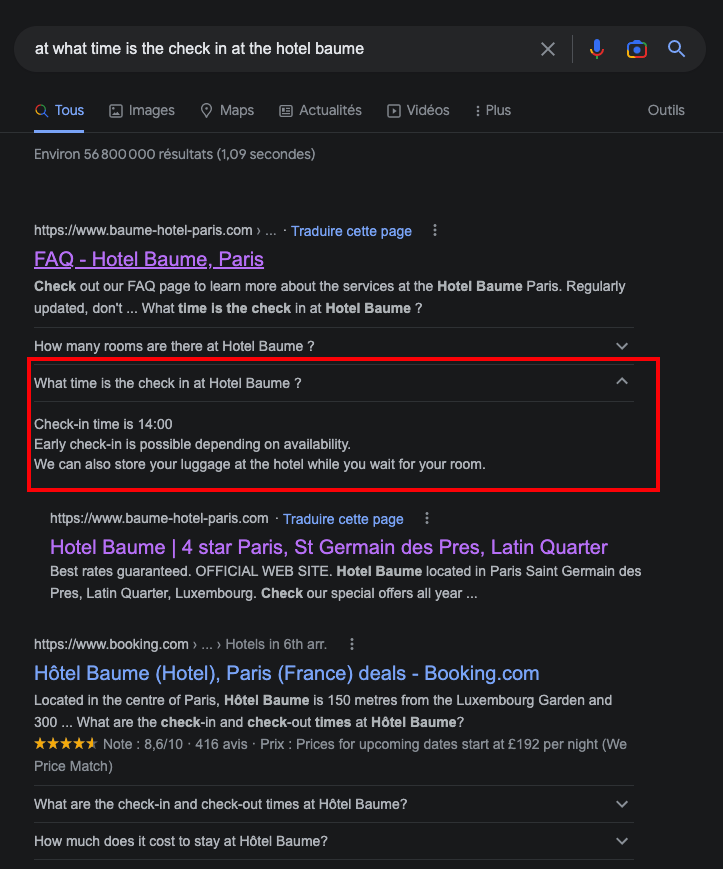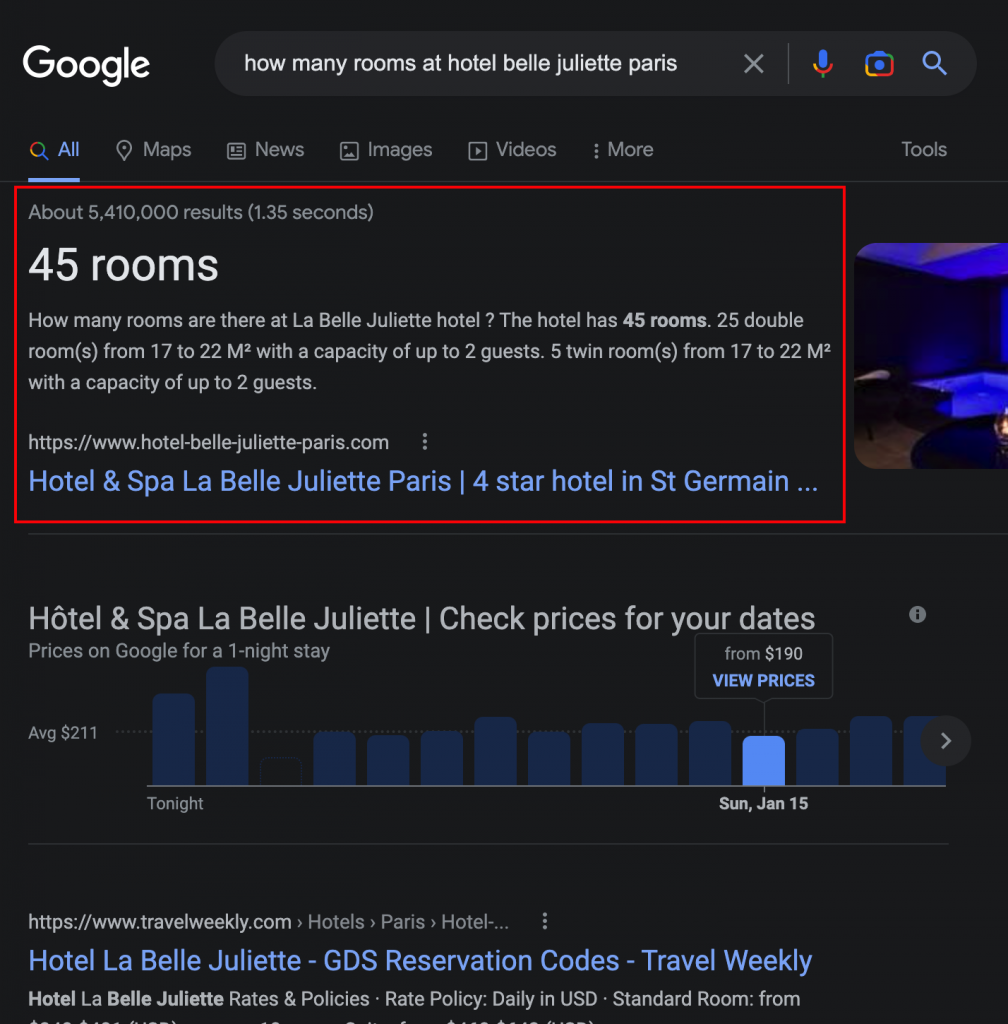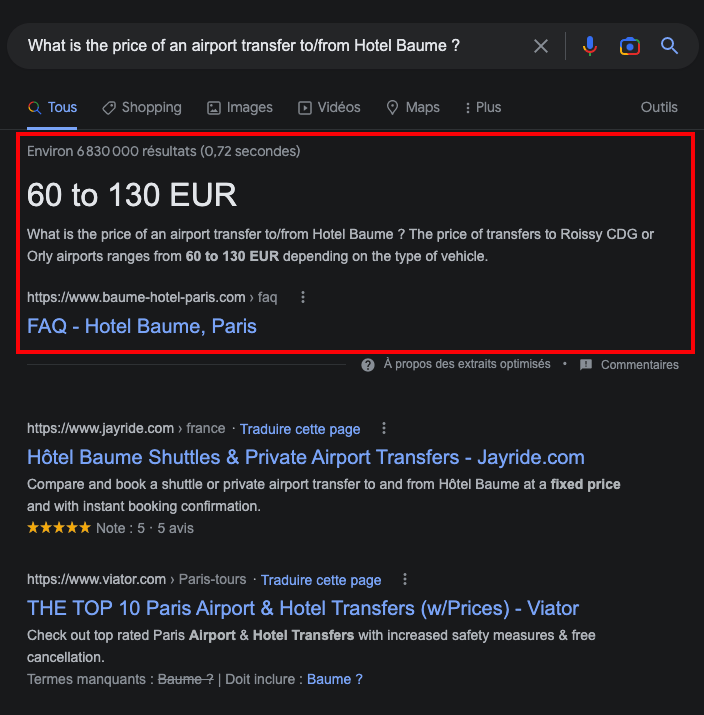Why do OTAs* (Booking.com, Expedia, etc.) often rank at the top of Google for searches about your hotel? How can you improve your hotel’s SEO using AI and big data? And Why is hotel SEO important? This article will explain why and how AI and big data can help you solve this problem.
*OTAs: or online travel agencies, are websites that allow users to make hotel reservations and travel services online.
* Q-SEO: the AI generated FAQs, Quicktext Search Engine Optimisation, if you want to improve your Google ranking (SEO services for hotels by using Artificial intelligence),
Inquire: what are the hotel’s frequently asked questions?
Ask the front desk manager for the five most frequently asked hotel questions.
Why? Front desk managers are often the best source of information about your customer queries. However, they will likely not know your hotel’s top FAQs, which means that no one else will be able to answer your questions.
Which means; without proper data, you may only have a rough estimate of your customers’ needs.So which data will you use when designing your hotel website, brochure, or room directory?
Here we are again, data, or lack thereof, in this case.
In short, without data, you have no tangible proof to help you make informed decisions at your property level.
The employee of the decade? Why is AI important for hotel SEO?
Artificial intelligence (AI) is becoming increasingly used to improve hotel SEO thanks to its ability to process and analyze large amounts of data (big data) to improve the search rankings of hotel websites.
By combining AI and SEO, hotels can boost the visibility of their websites on search engines.
Here is a simple explanation to understand the benefits of leveraging big data with artificial intelligence for optimizing SEO. Imagine if there is someone that has access to all information related to your guest queries and can rank them based on:
- the most frequently asked to the least
- the language they were asked in (there is no reason why questions in English and French should be the same)
- the nationality of the guest (would an Englishman and an Australian have similar needs?)
- and the time of year they were asked. (are questions asked in winter and summer the same?)
💡 The good news is that this someone does exist, and her name is Velma – an artificial intelligence specifically designed for hotels.
As we mentioned in a previous article ( Conversational AI in hospitality industry ), Velma, the artificial intelligence solution for hotels, is already the employee of the decade for your hotel… She never calls in sick, is never off work, and is never even-tempered. On the contrary, she is available 24/7 and can answer at least 85% of the questions she receives in 31 languages. Not to mention her salary, which is not subject to any social security contributions.
Action-Reaction: How to use AI for hotels?
Let’s get back to the main subject. Now that Velma, the hotel AI chatbot, has provided you with this valuable data, updated in real-time… How will you harness it? As previously discussed, it will help you make informed decisions.
If one of the most frequently asked questions is about parking, it might be beneficial to write an ad hoc answer and prevent it from ending up on a forgotten page on your website. That way, you can ensure that guests can easily find the information they need.” What needs to be said.
If it’s the restaurant, do you have a reservation system and all the menus available online (and, most importantly, updated)?
If it’s the SPA, do you have all the treatments available, the schedule…
Now, if you analyze the wording of questions, you will uncover valuable insights, as this analysis will help you improve the quality of the answers.
Once again, in common sense, if you know what questions were asked precisely, it will be easier to write the answers that address your customer queries. ge on your website. That way, you can ensure that guests can easily find the information they need.” What needs to be said : the Sequel.
David Copperfield: The magical connection between artificial intelligence and SEO
But what does a magician have to do with this connection? In this demonstration, we will show you how Velma can perform magic with data using a magic trick, aka a feature called Q-SEO.
Let’s go step by step.
Step 1: Velma knows the most frequently asked questions about the hotel and the corresponding answers in the form of structured data. These questions and answers are then fed into the Q-SEO feature. (Quicktext is the best SEO solution for hotels).
Step 2: Q-SEO generates relevant FAQs in multiple languages based on this information. (one FAQ per language).
Step 3: These FAQs are integrated into the hotel’s website in an optimized way for Google. This structured data allows search engines to understand the page’s content better and display it more effectively in search results (SERP). In our case, the FAQs could be displayed in the search results as data snippets (see screenshot).

Step 4: These FAQs are updated on a weekly basis to reflect current customer interests and seasonality.
Step 5: Google detects this frequently updated structured data and propels it to the top of search results, which are called Featured snippet. See screenshot.

Step 6: The magic happens and generates additional traffic. This process results in a higher ranking for hotel websites which translates into increased traffic.
We told you, it’s magic…
*Featured snippets: Are short snippets of text that appear at the top of Google’s search result in order to quickly answer a searcher’s query. (Source: Backlinko).
OTAs, How to improve your SEO with structured data?
As we discussed in our introduction, why it is that OATs often rank high in Google search results for long-tail queries such as ;
– does hotel X have a restaurant?
– how many rooms are available in hotel X?
– what is the checkout time at hotel X?
– Is hotel X child-friendly?
This is due to the fact that they have access to structured hotel data. But how do they get it? From the hotels themselves! When you spend hours filling out information sheets for OTAs, you are giving away valuable data that OTAs use to compete with you.
However, by doing so, you are working for free for the OTAs, who use your data to divert customers away from your hotel’s website. Furthermore, the worst part is the structured data you provided to the OTAs is not accessible to your hotel.
Well, that’s over.
The solution to this issue is for hotels to take control of their own structured data and use it to improve their own SEO and search rankings.
If you only take away one thing: How can AI improve the Google ranking for hotels?
Here is a simple answer: thanks to Velma and Q-SEO you will achieve the following:
– reach the featured snippet, which ranks your hotel at the top of the search results for specific queries (see screenshot below).

– Generate snippets: which associate FAQs with the hotel in Google results.
– Obtain additional results: Get more natural answers in Google Search Engine Result Page (SERP).
– Obtain voice responses through Google Assistant: Which are based on snippets and zero position.
– See a significant decrease in inbound calls of yes and no questions, meaning basic information that could be readily available in search engine results.
*Featured snippets: refers to the position of a search result on Google, which is displayed at the top of the page.
If you want to know how you can use AI to do local SEO for hotels, read the second part of this Article: Why you should focus more on Google (and bing) and less on OTAs.
Conclusion
It’s clear that playtime is over. After winning the battle of rate parity, you will now take control of your SEO and outperform OTAs, all thanks to Velma, the best dedicated virtual assistant for hotels.
Thanks to whom?
Also, we’re happy to announce that Q-SEO is fully compatible with the new Bing powered by ChatGPT, but that will be the topic of a future article ChatGPT for hotels.
FAQ


